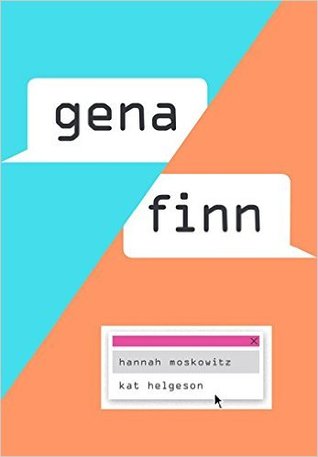TL;DR online friendships are nice
TBR #1337, added Jul 18 2015
finished 7/27/16
I initially considered buying this book because my Barnes and Noble had signed copies. Then I decided to check its listing on Amazon and found it for cheaper, so I was like "... why not" and bought it. It comes in at under 300 pages, so I was apprehensive on paying more than $15 for it. I was afraid of the potential that smaller = less good content.
And now that I've read it, I can say that it was just the right length for the story it told. It's also a mixed-media format (like Illuminae), and I think that cut down the amount of pages it needed (and words overall) while still being able to tell the story so beautifully.
I think part of the beauty is that we don't have all of the information, similar to Illuminae. (Though that was more like a tome than a YA book.) There's stuff that happens that we don't know about first-hand, since it happened IRL without any digital documentation, but all the info that was necessary was revealed through other formats. I think it definitely nailed giving information without info-dumping or being heavy-handed about it.
This is only the second fandom-themed book I've read, behind Fangirl. I didn't get quite as strong of a sense of the show itself (maybe because Fangirl was a little more ... blatant?) but my best guess is that Up Below is like a non-supernatural Supernatural. With a Dean and Sam that aren't related. (Confession: my knowledge of SPN comes from tumblr and my cousin.)
I'm also not quite sure of the website formats the girls used for their blogging? Some of it was more reminiscent of tumblr, and some was more like how I understand LiveJournal works. (Which, do people use LJ in newer fandoms? Asking the big questions here. I'm still a relative newbie in the grand scheme of things. #teamTumblr) I guess it's totally possible it's a big mix to avoid copyright / IP infringement and to transcend some of the divides between platforms.
I was surprised by the direction the plot took about halfway through. The buildup for it was done well, and the turning point felt realistic in that it was just as out of left field as it would've been in real life. The mood of the book definitely changes, though, as does the formats used. I think it's important because it explores some mental health topics that aren't otherwise touched in YA, or are the focus of the book rather than an addition to it.
(The same argument that we need more queer YA books that are about the kids doing their own things while being queer, not more books about them being hetero-divergent. I would love to see more books that feature neuro-divergent characters that don't define the entire book and plot on that fact but still include what those characters experience.)
I'm kind of torn on Gena and Finn's relationship. I think it's important to show that romance isn't just "find the dream boy, there u go, happy ending" in real life, but I don't really agree with the hints of more than close friendship between the girls. I think that's mainly because of the age difference between them, because they're in different periods of their lives. (They're both adults, though, so it's not icky, and I never got the sense it was more than just saying "I love you" and conflicted feelings.) I can say I appreciate where they are by the end of the book, though.
TL;DR all in all I enjoyed my read and the format was refreshing. I think it would be suitable for someone unfamiliar with fandom culture; it highlights it without including a whole bunch of jargon, and I think it showcases the better side of the community. (Except for Mallory, lol. Thank god we only had one of her in the book.)
CWs: unspecified* mental illness causing hallucinations, death, injuries, PTSD. These are especially heavy later in the book. (* I don't remember if they ever mentioned what it was diagnosed as or if it was never specifically brought up.)


No comments:
Post a Comment